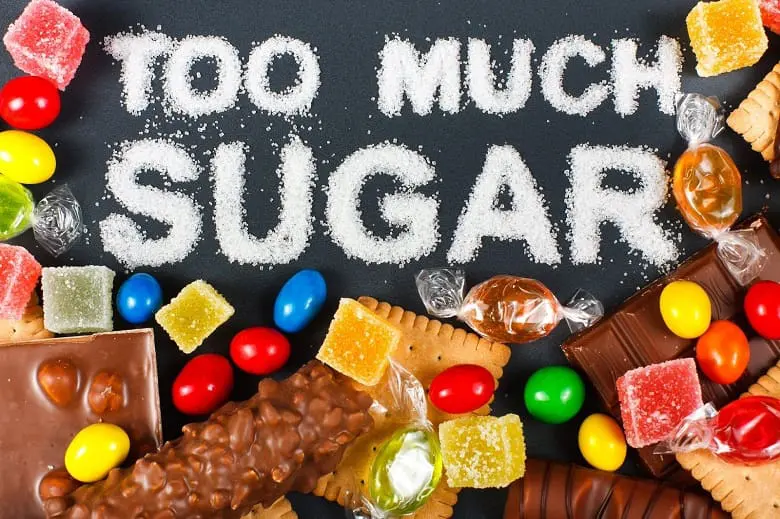10 Side Effects of Eating Too Much Sugar

Sugar or glucose is an important source of energy and is essential for the proper functioning of our body. The daily requirement of the human brain is around 130 grams of sugar (glucose).
 Ingesting sugar isn’t harmful unless you are limiting yourself to whole foods like vegetables, fruits, grains, and dairy as they contain natural sugars. The body digests these sugars naturally and the cells of your body get a steady supply of energy.
Ingesting sugar isn’t harmful unless you are limiting yourself to whole foods like vegetables, fruits, grains, and dairy as they contain natural sugars. The body digests these sugars naturally and the cells of your body get a steady supply of energy.
However, sugar starts taking a toll on your health and body when you consume added sugars found in non-alcoholic beverages, sweets, cakes and pies, cookies, dairy desserts such as ice cream or packaged fruit juices, daily. The human body does not require any added sugars as they have no nutritional value. They only give you “empty” calories that can have a gruesome effect on your health and weight.
Consuming too much sugar can not only contribute to weight gain, acne, and tiredness but also increase the risks of heart disease, type 2 diabetes, high cholesterol, kidney and blood sugar problems, etc.
 As per the American Heart Association, the daily intake of added sugar for women should not be more than 6 teaspoons (25 grams) and not more than 9 teaspoons (36 grams) for men.
As per the American Heart Association, the daily intake of added sugar for women should not be more than 6 teaspoons (25 grams) and not more than 9 teaspoons (36 grams) for men.
Always keep one basic mantra in mind:
Too much of anything is bad!
Here are some side effects of eating too much sugar and why should you move away from it:
1. Instant tiredness
 High levels of sugar consumption restrict the production of Orexin, a chemical in the human brain that stimulates the feeling of keeping awake. The higher your sugar intake, the higher are the chances of you feeling more lethargic and sleepy.
High levels of sugar consumption restrict the production of Orexin, a chemical in the human brain that stimulates the feeling of keeping awake. The higher your sugar intake, the higher are the chances of you feeling more lethargic and sleepy.
2. Acne breakouts
 Too much sugar can affect your skin because it causes an increase in insulin that will unleash your hormones. So, not only do you feel tired but you also have the dreaded pimples and acne on your face.
Too much sugar can affect your skin because it causes an increase in insulin that will unleash your hormones. So, not only do you feel tired but you also have the dreaded pimples and acne on your face.
3. Mood swings
 Of course, sugary foods can satisfy your taste buds and make you happy in the short term but it behaves in a contradictory manner in the long run. The sudden sugar rush leads to a sudden dip too and leads to a grumpy mood in no time.
Of course, sugary foods can satisfy your taste buds and make you happy in the short term but it behaves in a contradictory manner in the long run. The sudden sugar rush leads to a sudden dip too and leads to a grumpy mood in no time.
4. Brain fogging
 The negative impact of sugar on the brain is also noteworthy. Among the many factors that affect memory loss, sugar has a place of choice. Yes, your brain needs a constant supply of glucose in the blood to function properly so if you leave in the morning without eating anything, you risk being in a zombie mode. But beware, you do not want a sugar spike, so instead bet on slow sugars.
The negative impact of sugar on the brain is also noteworthy. Among the many factors that affect memory loss, sugar has a place of choice. Yes, your brain needs a constant supply of glucose in the blood to function properly so if you leave in the morning without eating anything, you risk being in a zombie mode. But beware, you do not want a sugar spike, so instead bet on slow sugars.
5. Intense thirst
 When there is too much sugar in the blood, the body produces more urine to eliminate this excess. This urge to urinate often provokes an intense thirst.
When there is too much sugar in the blood, the body produces more urine to eliminate this excess. This urge to urinate often provokes an intense thirst.
6. Weight gain
 If you do not indulge in regular and adequate levels of physical activity, this glucose will be stored as fat. Don’t be surprised if you struggle to put on your favorite pair of jeans!
If you do not indulge in regular and adequate levels of physical activity, this glucose will be stored as fat. Don’t be surprised if you struggle to put on your favorite pair of jeans!
7. Weak immune system
 Too much sugar weakens your immune system. This is because glucose reduces the activity of white blood cells. Consuming too much sugar regularly makes you more prone to diseases.
Too much sugar weakens your immune system. This is because glucose reduces the activity of white blood cells. Consuming too much sugar regularly makes you more prone to diseases.
8. Depression and Anxiety
 Inflammation has been linked to anxiety and depression. An increased intake of starchy foods and sugars can lead to inflammation.
Inflammation has been linked to anxiety and depression. An increased intake of starchy foods and sugars can lead to inflammation.
9. Liver Disease
 Chronic sugar malabsorption can lead to non-alcoholic fatty liver disease and non-alcoholic hepatitis, which is known as a silent disease because symptoms do not start to appear until it is too late.
Chronic sugar malabsorption can lead to non-alcoholic fatty liver disease and non-alcoholic hepatitis, which is known as a silent disease because symptoms do not start to appear until it is too late.
10. Lack of endurance
 If physical exercise seems to be getting harder and harder, a high-fructose diet could be the culprit. If you increase your blood glucose just before intense exercise, you may end up feeling very tired later on. Gulping a lot of simple sugars will lift your glycaemic index at once and drop it just as quickly, compromising your physical endurance and efforts.
If physical exercise seems to be getting harder and harder, a high-fructose diet could be the culprit. If you increase your blood glucose just before intense exercise, you may end up feeling very tired later on. Gulping a lot of simple sugars will lift your glycaemic index at once and drop it just as quickly, compromising your physical endurance and efforts.
The Bottom Line
It is therefore of paramount importance to return to a qualitative diet. This diet includes few processed products and more natural foods. To limit the damage, it is also necessary to eat a lot of fruits and vegetables because they contain fibres which slow down the absorption of the sugars and counteract the side effects of eating too much sugar.



